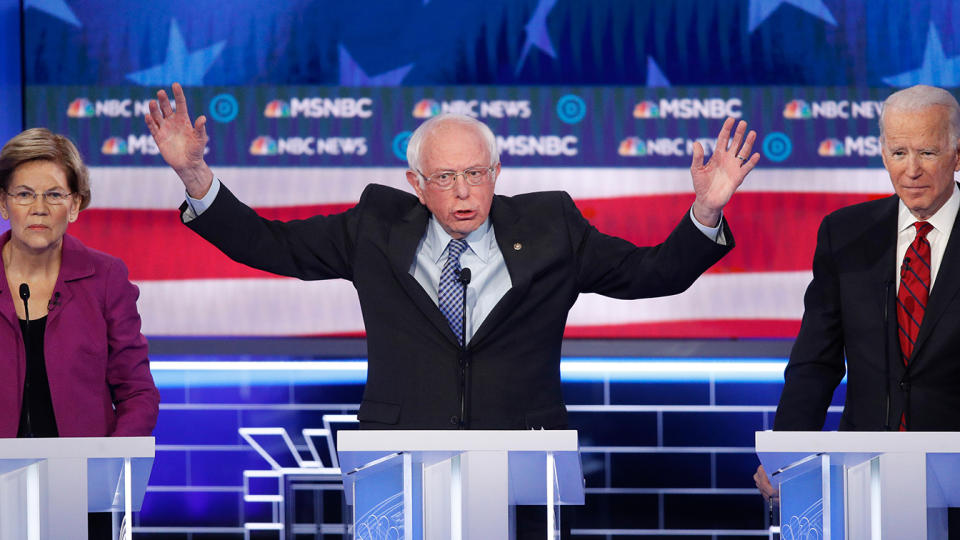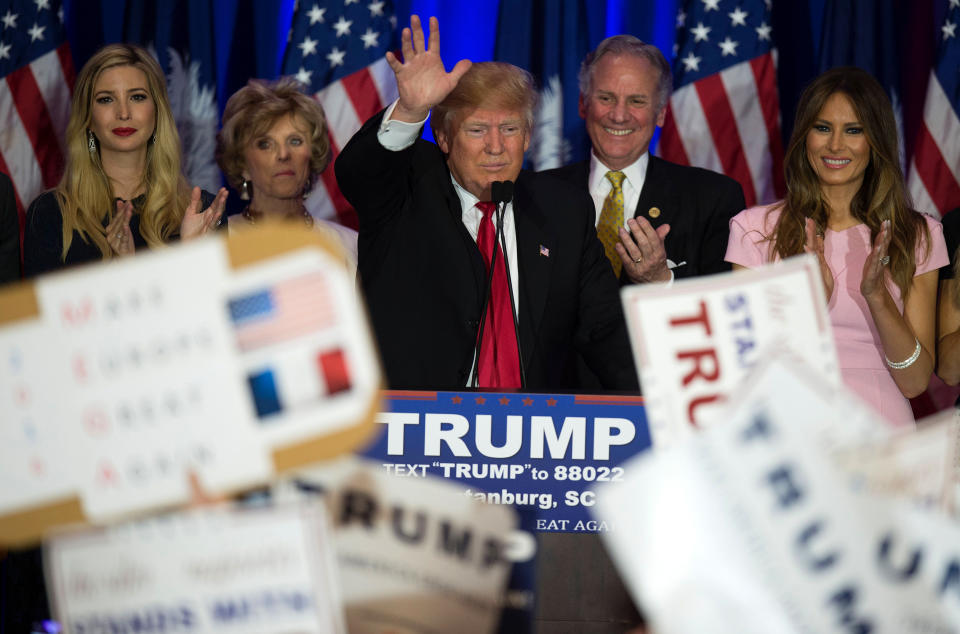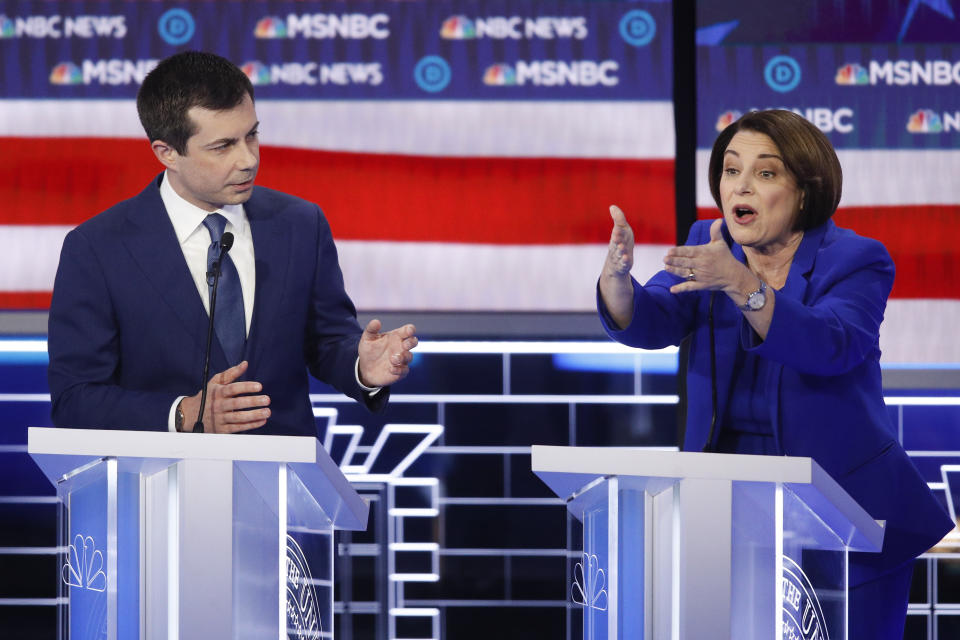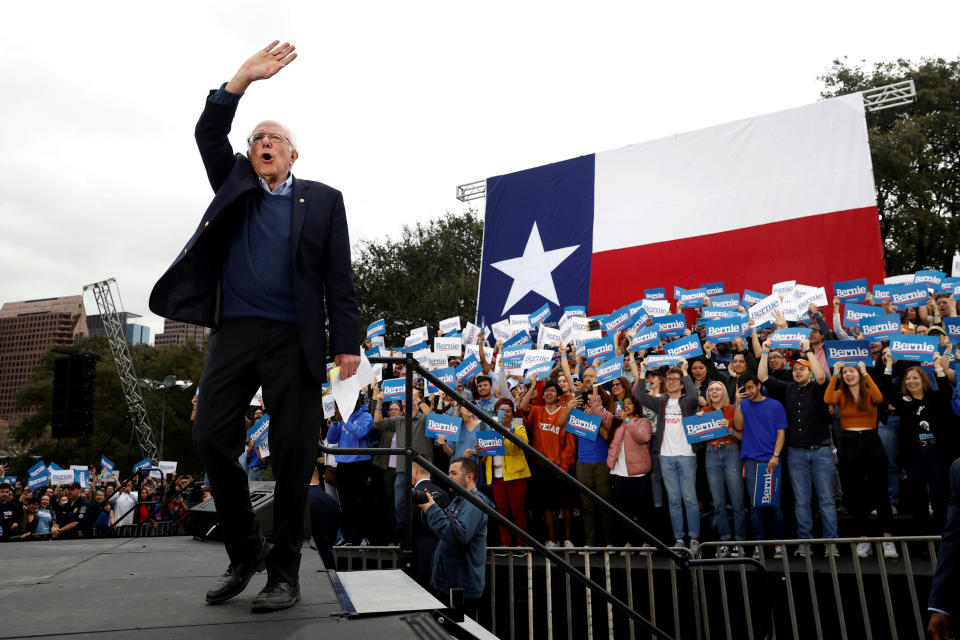Based on 2016, Democrats have exactly one week to stop the Bernie bandwagon
For Democrats who don’t support Bernie Sanders, it’s tempting to think that there’s plenty of time left to halt his march to the nomination. Sure, Sanders won the most votes in Iowa, New Hampshire and Nevada, they say. But that’s only three (relatively small) states. There are 47 to go — and another five months until the convention.
But that’s not how presidential primaries work. It’s especially not how they work with a sprawling, multicandidate field, and it’s definitely not how they work at this point in the process, with South Carolina’s primary on Saturday, followed three days later by Super Tuesday, when 1,137 delegates, a full third of the total, will be up for grabs in 14 states — including the big prizes of California and Texas.

“These races move very fast from, ‘Oh, I don't think he has a chance to win,’ to ‘Oh my gosh, he's going to win, and we better get on board,’” Republican strategist Tim Miller tells Yahoo News. “If you don't stop him before that pivot has completely happened, the thing is over in a flash.”
To be sure, Miller is just one strategist. But he speaks from experience: In 2016, he was the communications director for Jeb Bush who dropped out the night of the South Carolina primary (Feb. 27 that year) after losing to Donald Trump. Two days later, Miller joined the GOP’s major Stop Trump super-PAC as its spokesman, as he recalled in a recent column for the Bulwark; he still hasn’t reconciled with his party or with Trump, whom he frequently criticizes on Twitter. At the time, Miller thought the Republican establishment could defeat Trump. Looking back now, he realizes the race “was already functionally over.”

Given the structural similarities between 2016 and 2020 — an anti-establishment frontrunner with a passionate base and a fragmented opposition — Miller believes that Democrats will soon find themselves in the same position.
And by “soon,” he means in exactly seven days.
“After Super Tuesday, a pretty significant cross section of the country will have voted,” Miller explains. “And so for Democrats, all of the incentives will be to say, ‘We need to be supportive of and defensive of the person that is winning at that time.’ To marshal the resources to slow that momentum would take either an exogenous event or a massive, overwhelming show of force.”
Miller predicts that “there will just be no willingness to do that.” To illustrate his point, he recalls a conversation he had after Super Tuesday 2016 with a Republican “from the opposite end of the party as Trump.”
“Remember, we’re just a third of the way done here,” Miller said back then. “Let's go and recruit other people to join us and stop Trump now that we've narrowed this field down.”
The pitch fell flat. “He wouldn’t even throw me a bone and offer a statement saying he would support another candidate in his state,” Miller recalls. “All the people that we went to looked at us and said, ‘That seems like a bad bet.’”
So if history is any guide, Democrats who want to derail Sanders have one week left to do it, starting with Tuesday night’s debate in Charleston, S.C.
As Miller sees it, there’s a narrow path to stopping Sanders. The debate is key because it’s the last chance to change the dynamic before the vote in South Carolina. In 2016, the candidates opposing Trump — Bush, Rick Perry, Bobby Jindal, Rand Paul, Ted Cruz, and Marco Rubio — spent too much time “gutting each other” on stage, according to Miller. Meanwhile, they “waited until it was too late and they were too weak to attack Trump.”
The same thing is happening right now with the Democrats and Sanders. (See: Pete Buttigieg’s spat with Amy Klobuchar last week in Las Vegas.) Buttigieg, Klobuchar, Elizabeth Warren and Joe Biden aren’t going to elbow each other out of the way with canned critiques; there’s no incentive for any of them to drop out before Super Tuesday. The only productive thing they can do, says Miller, is to “demonstrate to voters watching that Sanders has some unique weaknesses and that they should have second thoughts about whether he can go the distance against Trump.”

“Bernie’s good on the debate stage,” Miller says. “He’s also really popular. So it’s not as simple as just attacking him. You have to take him on head on, but you can't do it in a way that looks desperate or makes people defensive of him. You've got to drive up his unfavorables, even if that would have been a much easier prospect 90 days ago than now.”
Mike Bloomberg has signaled that “nuking Bernie” will be his debate strategy. In the last few days his team released internal polling showing Sanders sinking down-ballot Democrats and highlighted his “loopy,” decades-old sex-focused alternative newspaper articles in an attempt to undercut the Vermont senator’s electability argument.
Other candidates will undoubtedly join Bloomberg in bashing Bernie in Charleston; he can expect attacks on his decades-ago praise for Fidel Castro and the Soviet Union, his record on guns, his promises on health care and questions about the state of his health. Whether the barrage will have any effect remains to be seen — but if it does, it will likely register at the polls Saturday in South Carolina, where Sanders has been gaining ground on Biden, the longtime Palmetto State frontrunner.
Yet despite Sanders’s momentum, the latest surveys still show Biden leading Sanders in South Carolina by more than 7 percentage points, on average, due to his strong support among older black voters, who dominate the Democratic electorate there. Miller thinks that Biden, or another candidate who wins in South Carolina, could have a slim but real shot at consolidating the anti-Bernie vote. “It would require that person to play to something as close as possible to a draw on Super Tuesday,” Miller says. “Then he or she would have to extend this thing into a legitimate two-person contest — something that’s basically unprecedented after Super Tuesday.”
So how could that conceivably play out? Buoyed by a South Carolina victory, a candidate like Biden could overperform in the heavily African-American Southern states that vote on Super Tuesday: Alabama, Arkansas, North Carolina, Oklahoma, Tennessee, Texas, Virginia. Shortly after, the other candidates still standing against Sanders could drop out. The dropout with the most money (hint, hint: Bloomberg) could “spend all of it” to hurt Sanders and help Biden with precisely the sort of “low-information” voters who have already been swayed by Bloomberg’s $400 million ad blitz. Perhaps Biden could form a unity ticket with another candidate; perhaps former President Barack Obama could endorse him. “Something really dramatic,” says Miller. And the primary could go on and on — with no one securing a majority of delegates, thanks to the Democratic Party’s proportional delegate rules — until a contested convention in Milwaukee.

Even in that scenario, Sanders would still be the favorite. He is likely to run strong in key Super Tuesday states including California, Utah, Vermont, Colorado, Maine, Massachusetts and Texas. Moreover, polls show that even if the rest of the candidates dropped out and allowed the opposition to coalesce around a single challenger, Sanders might retain or even expand his lead.
So stopping Bernie “is probably fantasy territory, even now,” Miller admits. “Voters like winners. Donors and politicians don’t want to be on the wrong side of the nominee. And Bernie keeps winning. His poll numbers against Trump are fine. He seems electable because of that. And Trump won last time, so everyone who’s worried about whether Sanders can win thinks, ‘What the hell do I know?’”
“To make a difference, his weakness as a nominee has to be demonstrated to them: either through ads, through a poor debate performance or through doing surprisingly terrible in South Carolina — or all of those things combined,” Miller continues. “To make people take a second look at this, there just has to be an overwhelming force pushing back against Sanders’s momentum. And it’s got to happen in the next seven days.”
Read more from Yahoo News:





